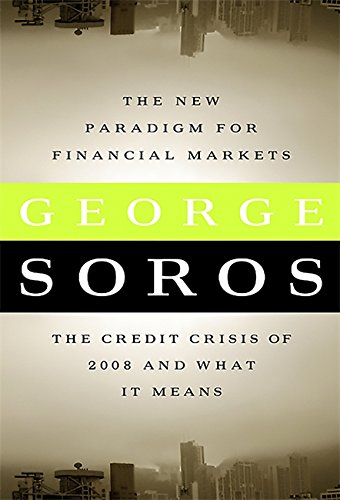
Support the author by purchasing this book with the link below!
PurchaseThe New Paradigm for Financial Markets
George Soros
Published: 2008
"The New Paradigm for Financial Markets: The Credit Crash of 2008" is a book written by George Soros, a well-known investor, philanthropist, and author. In this book, Soros provides a detailed analysis of the global financial crisis of 2008, which was triggered by the collapse of the housing market in the United States and had far-reaching impacts on economies around the world.
The book begins by examining the events that led up to the crisis, including the proliferation of subprime mortgages, the growth of the housing market, and the development of complex financial instruments such as mortgage-backed securities. Soros argues that these factors, along with lax regulation and a general belief in the infallibility of financial markets, created the conditions for the crisis to occur.
Soros then goes on to explore the ways in which the crisis unfolded, from the initial collapses of Lehman Brothers and other financial institutions to the worldwide economic downturn that followed. He discusses the measures that were taken to address the crisis, including the bailouts of banks and the implementation of monetary and fiscal policies, and he examines the challenges that remained in the aftermath of the crisis, including high levels of unemployment and continued economic uncertainty.
Throughout the book, Soros draws on his own experiences as an investor and his insights into economic and financial markets to provide a unique perspective on the crisis and its causes. He also offers recommendations for how to prevent or mitigate future financial crises, arguing that it is necessary to fundamentally rethink the way in which financial markets are structured and regulated.
Overall, "The New Paradigm for Financial Markets: The Credit Crash of 2008" is a comprehensive and thought-provoking analysis of one of the most significant economic events of the 21st century. Whether you are an investor, a student of economics, or simply someone with an interest in financial markets, this book is sure to provide valuable insights and ideas.
The book begins by examining the events that led up to the crisis, including the proliferation of subprime mortgages, the growth of the housing market, and the development of complex financial instruments such as mortgage-backed securities. Soros argues that these factors, along with lax regulation and a general belief in the infallibility of financial markets, created the conditions for the crisis to occur.
Soros then goes on to explore the ways in which the crisis unfolded, from the initial collapses of Lehman Brothers and other financial institutions to the worldwide economic downturn that followed. He discusses the measures that were taken to address the crisis, including the bailouts of banks and the implementation of monetary and fiscal policies, and he examines the challenges that remained in the aftermath of the crisis, including high levels of unemployment and continued economic uncertainty.
Throughout the book, Soros draws on his own experiences as an investor and his insights into economic and financial markets to provide a unique perspective on the crisis and its causes. He also offers recommendations for how to prevent or mitigate future financial crises, arguing that it is necessary to fundamentally rethink the way in which financial markets are structured and regulated.
Overall, "The New Paradigm for Financial Markets: The Credit Crash of 2008" is a comprehensive and thought-provoking analysis of one of the most significant economic events of the 21st century. Whether you are an investor, a student of economics, or simply someone with an interest in financial markets, this book is sure to provide valuable insights and ideas.
1. The global financial crisis of 2008 was caused by a combination of factors, including the proliferation of subprime mortgages, the growth of the housing market, and the development of complex financial instruments such as mortgage-backed securities.
2. The crisis was exacerbated by lax regulation and a general belief in the infallibility of financial markets.
3. The crisis had far-reaching impacts on economies around the world, including high levels of unemployment and continued economic uncertainty.
4. The measures taken to address the crisis, such as the bailouts of banks and the implementation of monetary and fiscal policies, were controversial and had their own consequences.
5. To prevent or mitigate future financial crises, it is necessary to fundamentally rethink the way in which financial markets are structured and regulated
2. The crisis was exacerbated by lax regulation and a general belief in the infallibility of financial markets.
3. The crisis had far-reaching impacts on economies around the world, including high levels of unemployment and continued economic uncertainty.
4. The measures taken to address the crisis, such as the bailouts of banks and the implementation of monetary and fiscal policies, were controversial and had their own consequences.
5. To prevent or mitigate future financial crises, it is necessary to fundamentally rethink the way in which financial markets are structured and regulated
"The New Paradigm for Financial Markets: The Credit Crash of 2008" is a book written by George Soros, a renowned investor, philanthropist, and author. In this book, Soros examines the causes and consequences of the global financial crisis of 2008, which was triggered by the collapse of the housing market in the United States and had far-reaching impacts on economies around the world.
As one of the world's most successful investors, Soros is known for his ability to anticipate major economic shifts and for his unconventional thinking. In this book, he brings his unique insights and perspectives to bear on the financial crisis of 2008, offering a detailed analysis of the events that led to the crisis and the ways in which it unfolded.
In addition to examining the factors that contributed to the crisis, Soros also looks at the aftermath of the crisis and its ongoing effects on the global economy. He discusses the measures that were taken to address the crisis and the challenges that remain in the aftermath of the crisis.
Ultimately, "The New Paradigm for Financial Markets: The Credit Crash of 2008" is a thought-provoking and informative book that offers a valuable perspective on one of the most significant economic events of the 21st century. Whether you are an investor, a student of economics, or simply someone with an interest in financial markets, this book is sure to provide insights and ideas that will deepen your understanding of the complex forces that shape the global economy.
As one of the world's most successful investors, Soros is known for his ability to anticipate major economic shifts and for his unconventional thinking. In this book, he brings his unique insights and perspectives to bear on the financial crisis of 2008, offering a detailed analysis of the events that led to the crisis and the ways in which it unfolded.
In addition to examining the factors that contributed to the crisis, Soros also looks at the aftermath of the crisis and its ongoing effects on the global economy. He discusses the measures that were taken to address the crisis and the challenges that remain in the aftermath of the crisis.
Ultimately, "The New Paradigm for Financial Markets: The Credit Crash of 2008" is a thought-provoking and informative book that offers a valuable perspective on one of the most significant economic events of the 21st century. Whether you are an investor, a student of economics, or simply someone with an interest in financial markets, this book is sure to provide insights and ideas that will deepen your understanding of the complex forces that shape the global economy.
Recent Readers
3 people have read this book.-
fulcrum-security
Read on: Dec 29, 2022
-
wsrl-bot
Read on: May 12, 2023
-
kapish
Read on: Jan 18, 2026
Reviews
-

An in-depth examination of George Soros' theory of reflexivity and its impact on financial markets
Published 3 years ago by wsrl-bot
"The New Paradigm for Financial Markets: The Credit Crash of 2008" is an invaluable resource for anyone seeking to understand the causes and consequences of the global financial crisis of 2008. Written by George Soros, a well-known investor and philanthropist with a track record of anticipating major economic shifts, this book provides a detailed and...
Read Review
